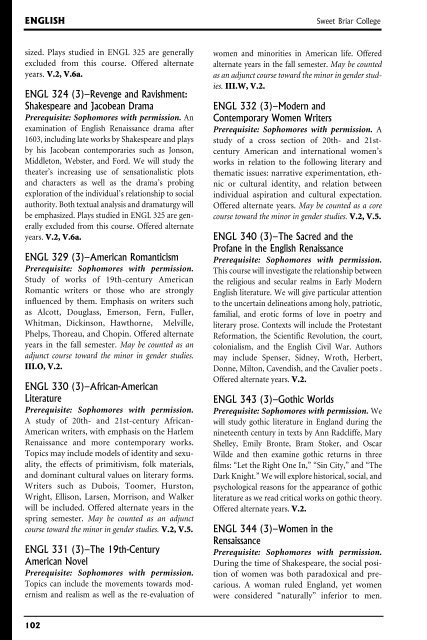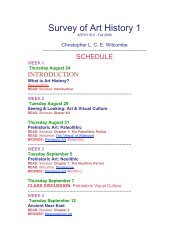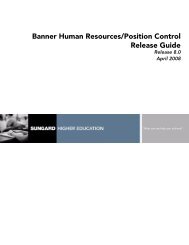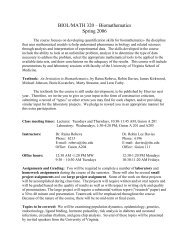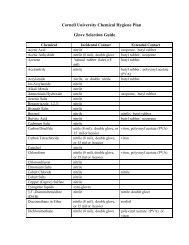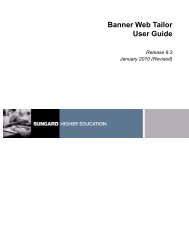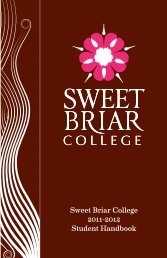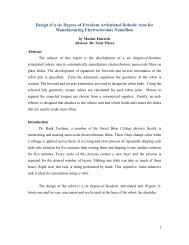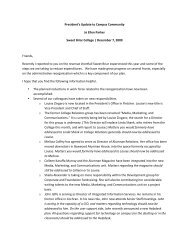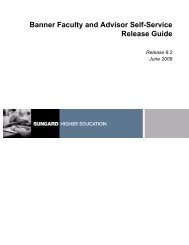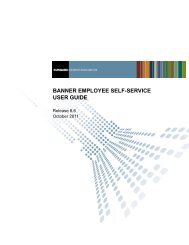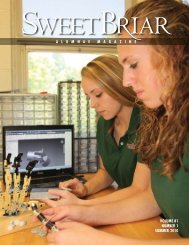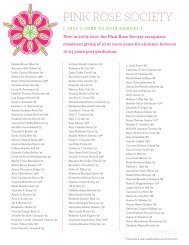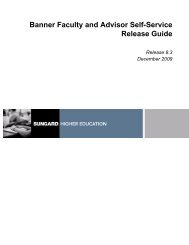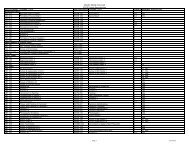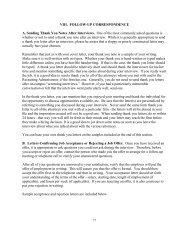english<strong>Sweet</strong> <strong>Briar</strong> <strong>College</strong>sized. Plays studied in ENGL 325 are generallyexcluded from this course. Offered alternateyears. V.2, V.6a.ENGL 324 (3)–Revenge and Ravishment:Shakespeare and Jacobean DramaPrerequisite: Sophomores with permission. Anexamination of English Renaissance drama after1603, including late works by Shakespeare and playsby his Jacobean contemporaries such as Jonson,Middleton, Webster, and Ford. We will study thetheater’s increasing use of sensationalistic plotsand characters as well as the drama’s probingexploration of the individual’s relationship to socialauthority. Both textual analysis and dramaturgy willbe emphasized. Plays studied in ENGL 325 are generallyexcluded from this course. Offered alternateyears. V.2, V.6a.ENGL 329 (3)–American RomanticismPrerequisite: Sophomores with permission.Study of works of 19th-century AmericanRomantic writers or those who are stronglyinfluenced by them. Emphasis on writers suchas Alcott, Douglass, Emerson, Fern, Fuller,Whitman, Dickinson, Hawthorne, Melville,Phelps, Thoreau, and Chopin. Offered alternateyears in the fall semester. May be counted as anadjunct course toward the minor in gender studies.III.O, V.2.ENGL 330 (3)–African-AmericanLiteraturePrerequisite: Sophomores with permission.A study of 20th- and 21st-century African-American writers, with emphasis on the HarlemRenaissance and more contemporary works.Topics may include models of identity and sexuality,the effects of primitivism, folk materials,and dominant cultural values on literary forms.Writers such as Dubois, Toomer, Hurston,Wright, Ellison, Larsen, Morrison, and Walkerwill be included. Offered alternate years in thespring semester. May be counted as an adjunctcourse toward the minor in gender studies. V.2, V.5.ENGL 331 (3)–The 19th-CenturyAmerican NovelPrerequisite: Sophomores with permission.Topics can include the movements towards modernismand realism as well as the re-evaluation ofwomen and minorities in American life. Offeredalternate years in the fall semester. May be countedas an adjunct course toward the minor in gender studies.III.W, V.2.ENGL 332 (3)–Modern andContemporary Women WritersPrerequisite: Sophomores with permission. Astudy of a cross section of 20th- and 21stcenturyAmerican and international women’sworks in relation to the following literary andthematic issues: narrative experimentation, ethnicor cultural identity, and relation betweenindividual aspiration and cultural expectation.Offered alternate years. May be counted as a corecourse toward the minor in gender studies. V.2, V.5.ENGL 340 (3)–The Sacred and theProfane in the English RenaissancePrerequisite: Sophomores with permission.This course will investigate the relationship betweenthe religious and secular realms in Early ModernEnglish literature. We will give particular attentionto the uncertain delineations among holy, patriotic,familial, and erotic forms of love in poetry andliterary prose. Contexts will include the ProtestantReformation, the Scientific Revolution, the court,colonialism, and the English Civil War. Authorsmay include Spenser, Sidney, Wroth, Herbert,Donne, Milton, Cavendish, and the Cavalier poets .Offered alternate years. V.2.ENGL 343 (3)–Gothic WorldsPrerequisite: Sophomores with permission. Wewill study gothic literature in England during thenineteenth century in texts by Ann Radcliffe, MaryShelley, Emily Bronte, Bram Stoker, and OscarWilde and then examine gothic returns in threefilms: “Let the Right One In,” “Sin City,” and “TheDark Knight.” We will explore historical, social, andpsychological reasons for the appearance of gothicliterature as we read critical works on gothic theory.Offered alternate years. V.2.ENGL 344 (3)–Women in theRensaissancePrerequisite: Sophomores with permission.During the time of Shakespeare, the social positionof women was both paradoxical and precarious.A woman ruled England, yet womenwere considered “naturally” inferior to men.102
<strong>2010</strong>-<strong>2011</strong> Catalog EnglishIn this course, we will examine Early Modernliterature written by women- as well as literaturewritten by men about women- that exploreswomen’s various roles in both personal andpublic Renaissance settings. Offered alternateyears. May be counted as an adjunct course towardthe minor in gender studies. III.W, V.2, V.5.ENGL 361 (1, 2, or 3)–Special StudyPrerequisites: One 100-level ENGL course andpermission of the instructor. Study at an intermediatelevel of selected topics in literature orwriting to be pursued by individual studentsunder the immediate supervision of a departmentmember.ENGL 367 (3)–Visionary Rebels:Romantic ArtistsPrerequisite: Sophomores with permission.This course explores Romantic poets and Gothicnovelists, focusing on key Romantic ideas such asthe artist as hero, the sublime, nature and the imagination,the irrational, and revolution. It will thenstudy parallel developments in painting throughthe examples of Constable, Delacroix, and Turner,and in music through the examples of Beethoven,Chopin, Liszt, and Berlioz. Offered alternate years.V.1, V.2.ENGL 377 (.5, 1, 2, or 3)–InternshipPrerequisite: Permission of the instructor,department chair, and dean. This course isgraded P/CR/NC only.ENGL 380 (3)–Classics of Modern DramaPrerequisite: Sophomores with permission. Astudy of the major western playwrights, dramatictheories, and theatrical styles of the twentieth century.The dramatists studied will include Ibsen,Chekov, Synge, Pirandello, O’Neill, Williams,Miller, Beckett, Ionesco, Hansberry, Pinter, andWilson. Offered alternate years. V.2, V.6a.ENGL 382 (3)–ContemporaryInternational FictionPrerequisite: Sophomores with permission.This course is designed to suggest the range,variety, and possibilities of the novel today.Readings will come from all across the Englishspeakingworld. Their diversity will itself be acentral theme. Since these works also registerdeep responses to social changes and historicalcrises, discussions will often focus on relationsbetween literary texts and their wider contexts.Offered alternate years. Not open to studentswho have credit for ENGL 398. III.W, V.2.ENGL 386 (3)–Fatal Attractions: Deathand Sex in the 19th-Century NovelPrerequisite: Sophomores with permission.This course will study the conjunction betweensex and death in the nineteenth-century novel.It will explore the relationship between prostitutionand death, criminality and death, and carnallove and death in the novels of Flaubert, Zola,Dickens, the Brontes, George Eliot, ThomasHardy, and Mary Shelley. Theoretical worksto be studied are those of Foucault, Freud, andDarwin. Offered alternate years. V.2.ENGL 393 (3)–Modern PoetryPrerequisite: Sophomores with permission.This course focuses on the poetry of Yeats,Lawrence, Eliot, Stein, Millay, and Hughes. Wewill study their distinctive poetic achievementsin relation to relevant traditions and contexts.In particular we will examine how their poetryreflects or contests modern ideas about the self,the nature of language, the significance of poeticforms, and the purpose of poetry. Offered alternateyears in the fall semester. May be counted asan adjunct course toward the minor in gender studies.III.O, V.2.ENGL 394 (3)–Contemporary PoetryPrerequisite: Sophomores with permission. Astudy of a wide range of poetry in Englishfrom the mid-twentieth century to the present.Poets may include Auden, Larkin, Bishop,Lowell, Sexton, Plath, Brooks, Rich, Heaney,and Walcott. We will focus on questions ofform, technique, and interpretation while relatingthese works to relevant movements and traditionsas well as to the writers’ lives and times.Offered alternate years in the spring semester.May be counted as an adjunct course toward theminor in gender studies. III.O, V.2.103
- Page 1:
S w e e t B r i a r CollegeCatalog
- Page 6:
A Brief HistorySweet Briar Collegei
- Page 14 and 15:
academic scholarshipsVirginia resid
- Page 17 and 18:
2010-2011 Catalog student lifephysi
- Page 19 and 20:
2010-2011 Catalog student lifeColle
- Page 21 and 22:
2010-2011 Catalog college feesThis
- Page 24 and 25:
general policiesSweet Briar College
- Page 26 and 27:
general policiesSweet Briar College
- Page 28 and 29:
academic programsSweet Briar Colleg
- Page 30 and 31:
academic programsSweet Briar Colleg
- Page 32 and 33:
academic programsSweet Briar Colleg
- Page 34 and 35:
academic programsSweet Briar Colleg
- Page 36 and 37:
academic regulationsAcademicRegulat
- Page 38 and 39:
academic regulationsSweet Briar Col
- Page 40 and 41:
equirements for the degreeSweet Bri
- Page 42 and 43:
equirements for the degreeSweet Bri
- Page 44 and 45:
equirements for the degreeSweet Bri
- Page 46 and 47:
equirements for the degreeSweet Bri
- Page 48 and 49:
Courses of instructionSweet Briar C
- Page 50 and 51:
Anthropology and ArchaeologySweet B
- Page 52 and 53:
Anthropology and ArchaeologySweet B
- Page 54 and 55: Anthropology and ArchaeologySweet B
- Page 56 and 57: arts ManagementSweet Briar CollegeA
- Page 58 and 59: BiologyBiologyModern biology has ev
- Page 60 and 61: BiologySweet Briar CollegeBIOL 104
- Page 62 and 63: iologySweet Briar Collegeogy, anato
- Page 64 and 65: BusinessBusinessThe mission of the
- Page 66 and 67: BusinessSweet Briar Collegefunction
- Page 68 and 69: BusinessSweet Briar Collegeincludin
- Page 70 and 71: ChemistrySweet Briar Collegelaborat
- Page 72 and 73: chemistrySweet Briar CollegeCourse
- Page 74 and 75: chemistrySweet Briar CollegeCHEM 33
- Page 76 and 77: classics, philosophy, and religionS
- Page 78 and 79: classics, philosophy, and religionS
- Page 80 and 81: classics, philosophy, and religionS
- Page 82 and 83: classics, philosophy, and religionS
- Page 84 and 85: classics, philosophy, and religionS
- Page 86 and 87: classics, philosophy, and religionS
- Page 88 and 89: economicsSweet Briar CollegeECON 10
- Page 90 and 91: educationSweet Briar CollegeThrough
- Page 92 and 93: educationSweet Briar CollegeEDUC 22
- Page 94 and 95: englishSweet Briar Collegeable outc
- Page 96 and 97: englishSweet Briar Collegeare encou
- Page 98 and 99: englishSweet Briar CollegeStudents
- Page 100 and 101: englishSweet Briar CollegeENGL 110
- Page 102 and 103: englishSweet Briar CollegeENGL 218
- Page 106 and 107: EnglishSweet Briar CollegeENGL 397
- Page 108 and 109: EnglishSweet Briar Collegeand op-ed
- Page 110 and 111: environmental studiesSweet Briar Co
- Page 112 and 113: environmental studiesSweet Briar Co
- Page 114 and 115: equine studiesSweet Briar CollegeEN
- Page 116 and 117: gender studiesSweet Briar Collegeas
- Page 118 and 119: government and international affair
- Page 120 and 121: government and international affair
- Page 122 and 123: government and international affair
- Page 124 and 125: historySweet Briar Collegewhich cou
- Page 126 and 127: historySweet Briar CollegeHIST 144
- Page 128 and 129: historySweet Briar CollegeHIST 272
- Page 130 and 131: HistorySweet Briar Collegears, and
- Page 132 and 133: History of artSweet Briar Collegeth
- Page 134 and 135: History of artart theory in the 15t
- Page 136 and 137: honors programSweet Briar Collegeon
- Page 138 and 139: Interdisciplinary studiesSweet Bria
- Page 140 and 141: latin American studiesSweet Briar C
- Page 142 and 143: law and societySweet Briar CollegeC
- Page 144 and 145: Mathematical and computer sciencesS
- Page 146 and 147: Mathematical and computer sciencesS
- Page 148 and 149: mathematical economicsSweet Briar C
- Page 150 and 151: modern languages and literaturesSwe
- Page 152 and 153: modern languages and literaturesSwe
- Page 154 and 155:
modern languages and literaturesSwe
- Page 156 and 157:
modern languages and literaturesSwe
- Page 158 and 159:
modern languages and literaturesSwe
- Page 160 and 161:
modern languages and literaturesSwe
- Page 162 and 163:
modern languages and literaturesSwe
- Page 164 and 165:
musicSweet Briar CollegeCourse Desc
- Page 166 and 167:
musicSweet Briar CollegeMUSC 245 (1
- Page 168 and 169:
physical education, athletics, and
- Page 170 and 171:
physical education, athletics, and
- Page 172 and 173:
physics and engineeringSweet Briar
- Page 174 and 175:
physics and engineeringSweet Briar
- Page 176 and 177:
physics and engineeringSweet Briar
- Page 178 and 179:
physics and engineeringSweet Briar
- Page 180 and 181:
psychologySweet Briar CollegeThe Ps
- Page 182 and 183:
psychologySweet Briar CollegePSYC 3
- Page 184 and 185:
iding programReligionSee the Depart
- Page 186 and 187:
iding programSweet Briar CollegeRDP
- Page 188 and 189:
sociologySweet Briar CollegeNote: F
- Page 190 and 191:
sociologySOCI 450 (3)-Sociological
- Page 192 and 193:
studio artSweet Briar CollegeARTS 1
- Page 194 and 195:
studio artSweet Briar Collegetorica
- Page 196 and 197:
theatre and danceSweet Briar Colleg
- Page 198 and 199:
theatre and danceSweet Briar Colleg
- Page 200 and 201:
theatre and danceSweet Briar Colleg
- Page 202 and 203:
theatre and danceSweet Briar Colleg
- Page 204 and 205:
Academic honorsSweet Briar Collegeo
- Page 206 and 207:
Academic HonorsSweet Briar CollegeT
- Page 208 and 209:
facultySweet Briar CollegeGraduate
- Page 210 and 211:
FacultySweet Briar CollegeLinda S.
- Page 212 and 213:
FacultySweet Briar CollegeRebecca M
- Page 214 and 215:
FacultySweet Briar CollegeEmeritiGr
- Page 216 and 217:
Board of DirectorsSally Old Kitchin
- Page 218 and 219:
AdministrationSweet Briar CollegeOf
- Page 220 and 221:
indexSweet Briar CollegeFFaculty, 2
- Page 222 and 223:
Communications with the CollegeAdmi


